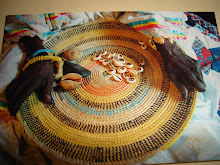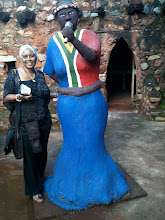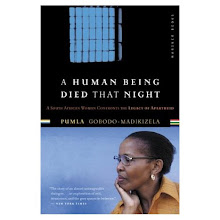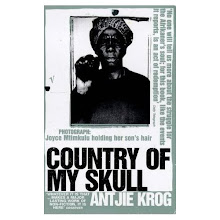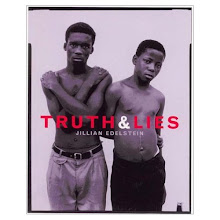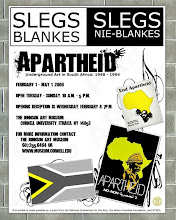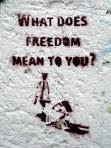 I awoke this Thanksgiving morning with the song of Wimoweh in my head. And I wanted to say thank you (Ngiyabonga) to one of my heroines. As a child I will always remember hearing Miriam Makeba songs in our household. It was our family's connection to South Africa, when we moved to London in 1954. Just five years later in 1959, at the age of 27, Makeba's passport was revoked for criticizing apartheid, she was banned from returning home, and did not see South Africa for the next 30 years. Described as "our own nut brown baby" by the Manhattan Brothers and having the voice of a "nightingale" Makeba not only brought to her work a presence of deep soul, passion and a unique brand of music but she never forgot the struggle of her people in South Africa, often using her songs to tell the story.
I awoke this Thanksgiving morning with the song of Wimoweh in my head. And I wanted to say thank you (Ngiyabonga) to one of my heroines. As a child I will always remember hearing Miriam Makeba songs in our household. It was our family's connection to South Africa, when we moved to London in 1954. Just five years later in 1959, at the age of 27, Makeba's passport was revoked for criticizing apartheid, she was banned from returning home, and did not see South Africa for the next 30 years. Described as "our own nut brown baby" by the Manhattan Brothers and having the voice of a "nightingale" Makeba not only brought to her work a presence of deep soul, passion and a unique brand of music but she never forgot the struggle of her people in South Africa, often using her songs to tell the story. I believe it was her way to stay connected to the beloved country that she was tragically exiled from. It is an act of violence and abuse on every level to prevent a human being from returning to their homeland, and its impact-and I am without a doubt, was a slow wearing away of the spirit. But despite the pain she felt, like Paul Robeson, the African American singer, actor and activist, who lived for many years in exile from the USA, she never gave up, always stepping up to the opportunity to speak out, using her worldwide fame to bring attention to the abomination and iron cage of apartheid that kept her away from her family.
Whether she was singing about the ghettos, celebration, hunger, or in many languages (her own being Xhosa) she inspired a sense of hope in us, and her music represents a cry from the heart, becoming the voice of South Africa. She wrote in her autobiography, Makeba My Story:
"It was the Superior Being that gave me a voice to sing with, but it was my mother and grandmother who gave me my first words to sing..."
Mama Africa died of a heart attack (or was it a broken heart) after performing on stage, at the age of 76. She was a mother and a grandmother and was loved the world over. I can only hope that it felt like the perfect world she describes in her book.
Her mother was a sangoma. Traditionally in South Africa a sangoma divines the future through the wisdom of the ancestors, heals the sick, and guides others around them. In her book she tells the story of wearing the robe of her mother on stage , and every so often when she did she would not be conscious of the songs she sang. I myself find that in the practice of divining, I cannot remember what I said. It is the ancestors working through me. A friend of hers who knew about sangomas and the spirit of amadlozi suggested that the amadlozi were stealing the show! She thought that like her mother she too was possessed by spirits, and she then wondered about her only child. Her own pain around her daughter, her disappearances, her sickness and final death caused Makeba much grief and worry. She finally consulted a sangoma. Makeba's own belief was that it was the enforced exile upon her and so her daughter, among other things, that contributed to her daughter's sickness.
She was a committed Pan Africanist who was welcomed anywhere in the world. After one of her four husbands, (who also included Hugh Masakela) Stokely Carmichael, the radical civil rights campaigner who fell into trouble with the authorities in the USA , she opted for exile in Guinea.
Mama Africa died of a heart attack (or was it a broken heart) after performing on stage, at the age of 76. She was a mother and a grandmother and was loved the world over. I can only hope that it felt like the perfect world she describes in her book.
"Going on stage to sing is like stepping into a perfect world. All that matters is the music, I live for this. And the message the few heartfelt words that I say to plead for my people, this makes it even more perfect. The concert stage: This is the one place where I am most at home, where there is no exile. If I die on stage I guess I will be the happiest person, because I will be dying like a soldier on the battlefield. " (from Makeba My Story )
I have been struck by her autobiography, in particular her humility and shyness despite her world adoration and fame. This is a striking contrast in the few clips I have seen of her perform. She transmits confidence, boldness and a powerful presence that never showed her troubles.
Mama Afrika my personal invocation to you: "Welcome home Mama Afrika, may you rest in peace knowing you are free, you are on my ancestral alter to remind me of your strength, resilliance and courage in the face of struggle. Help us to remember to never give up. Be an ally to us when we are human and vulnerable. You embodied grace, dignity, humility. Remind me of all of this. Nudge me to continue singing the songs of South Africa. They are the songs that speak of justice and freedom, which are rightly ours"

